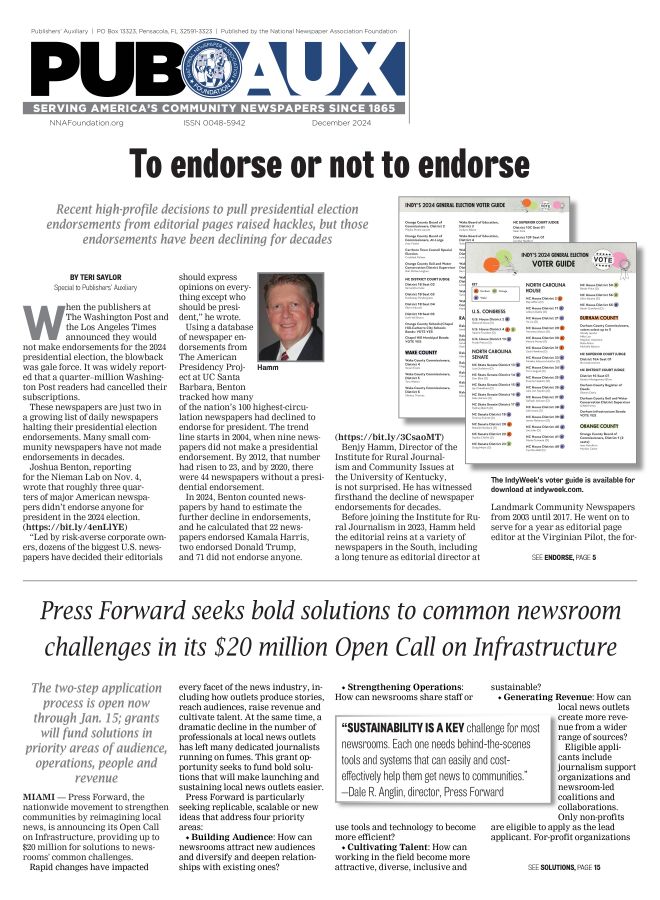USPS mail volume could drop
Jun 25, 2012
WASHINGTON—Community newspaper publishers are holding back on decisions to use mail delivery because of the many uncertainties surrounding the U.S. Postal Service, National Newspaper Association Postal Committee Chair Max Heath told the Postal Regulatory Commission in June.
On a separate front, USPS announced a revision in its plans to close mail processing plants, saying only 45 would be tackled in 2012, rather than the 200-plus originally considered. Then the closings will end until after the November elections and Christmas mailing season, to resume in 2013. (A copy of the 2012 plant schedule is available at here.)
Threats of rate increases, loss of weekend mail delivery and weaker service standards have caused USPS to lose mail volume from the newspaper industry, he said. Heath and David Bordewyk, South Dakota Newspaper Association executive director, testified in a hearing on USPS’ proposal to eliminate overnight mail delivery as mail processing plants close.
“A lot of people are scared that delivery is going to get so bad that they can’t count on the Postal Service anymore, so there’s a lot of issues that people consider in the discussion of closing plants and affecting service standards,” Heath testified under cross-examination by USPS attorneys. “Frankly, it’s scared a lot of people.”
Bordewyk testified on a campaign organized by SDNA to protest the closing of mail processing plants in the state and the ending of Saturday delivery. A website, www.deliverthemail.org was set up to allow citizens to sign a petition against service reductions. South Dakotans weighed in with concerns ranging from loss of services to farmers to the inability of villages to get government-mandated water samples in to a laboratory within a 24-hour window for testing. The responses were provided to the South Dakota Congressional delegation.
A USPS attorney questioned whether SDNA had explained to petitioners that the Postal Service must cut expenses to survive.
“We wanted to convey to our members of our congressional delegation that, look, we understand that there are challenges and issues that the Postal Service needs to deal with and we’re not trying to be blind to those, but at the same time, we’re just asking for more consideration than what we thought we were seeing (for) a rural state like South Dakota in terms of what the impact of these changes would be for our state,” Bordewyk said.
PRC Commissioner Mark Acton quizzed Heath on the Postal Service’s willingness to accommodate mailers in need of change, particularly in response to the relatively new overnight drop policy that NNA secured from USPS. Under the current policy, in-county newspapers with fewer than 5,000 copies in a mailing and fewer than 300,000 in a year can request special permission to leave papers on a postal dock after hours and provide the required documentation the following day. Heath said the policy worked fairly well. But, he said, NNA is requesting a higher annual limit so that larger newspapers may participate.
Acton said he wondered whether service-related issues in general, ranging from threats to end Saturday mail to the loss of overnight delivery would compound newspapers’ concerns.
“What about the prospect of both a change in service standards and the elimination of Saturday delivery?” Acton said. “I mean, is there a redundant or an exponential impact at work here?”
“I called that Postalgeddon in one of my (Pub Aux) columns,” Heath responded. “I really thought it would be that bad if they were able to combine drastic plant closings, post office closings and five-day delivery at the same time. To some degree I think maybe the Postal Service has woken up and understands that that is the case I believe, if I’m not mistaken. The impact—of all that happening, too much at the same time—would be terrible, in my opinion, on almost everybody that has a periodical or newspaper.”
Heath also emphasized the need for greater clarity from USPS on the use of transportation hubs as USPS closes mail processing plants.
PRC Chair Ruth Goldway asked whether he believed NNA fully understood USPS’ plans for setting up the hubs.
“We’re sort of operating on a hope and a prayer right now,” Heath said. “David Williams (USPS senior vice president for operations) has been very generous in offering this operation of the hubs, but we understand that it’s a work in progress. So our testimony here is designed to try to underscore the hope and sort of a promise. We want to see it get past the work in progress and to be a reality.”
Heath also said he believed USPS would need to relax the minimum piece requirements for containers moving through the hubs so that containers could go directly to their destinations. He also recommended that USPS complete the development and distribution of “mail.xml,” a digital protocol that will allow smaller mailers to transmit electronic filings of postage statements.
Bordewyk said no discussion of hubs to help resolve service problems around a closed Mobridge, SD, plant had occurred. Commissioner Nanci Langley asked whether the Postal Service had followed up on concerns expressed by publishers and other customers before the plant closed.
“I continue to talk to those publishers on occasion in the course of my job, and those frustrations are still there,” Bordewyk said. “Those delivery problems are still there since that closure. They have not found any other solutions to alleviate some of that, so those frustrations are real and exist today.”
The PRC is required to review changes in service standards before the Postal Service’s implementation of national changes. Its decision is not expected before the end of July. USPS, however, has gone ahead and implemented some of the changes, having asked the PRC to move faster and being told the review process could not be completed earlier.
The American Postal Workers Union has filed a legal complaint against USPS for moving ahead without the PRC’s imprimatur.







